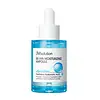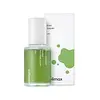What's inside
What's inside
 Key Ingredients
Key Ingredients

 Benefits
Benefits

 Concerns
Concerns

 Ingredients Side-by-side
Ingredients Side-by-side

Water
Skin ConditioningGlycerin
HumectantButylene Glycol
HumectantDipropylene Glycol
HumectantPropanediol
SolventChlorphenesin
AntimicrobialPhenoxyethanol
PreservativeCarbomer
Emulsion StabilisingGlycereth-25 PCA Isostearate
EmulsifyingTromethamine
BufferingCaprylyl Glycol
EmollientHexylglycerin
HumectantDisodium EDTA
Parfum
MaskingGlyceryl Acrylate/Acrylic Acid Copolymer
HumectantAllantoin
Skin ConditioningPanthenol
Skin ConditioningSodium Hyaluronate
HumectantHyaluronic Acid
HumectantHydrolyzed Hyaluronic Acid
HumectantXylitylglucoside
Humectant1,2-Hexanediol
Skin ConditioningAnhydroxylitol
HumectantAmmonium Polyacrylate
StabilisingXylitol
HumectantHydroxypropyltrimonium Hyaluronate
Hydrolyzed Sodium Hyaluronate
Skin ConditioningPotassium Hyaluronate
Skin ConditioningSodium Hyaluronate Crosspolymer
HumectantPentylene Glycol
Skin ConditioningCholesterol
EmollientCeramide NP
Skin ConditioningOleic Acid
EmollientPicramic Acid
Stearic Acid
CleansingSodium Acetylated Hyaluronate
HumectantWater, Glycerin, Butylene Glycol, Dipropylene Glycol, Propanediol, Chlorphenesin, Phenoxyethanol, Carbomer, Glycereth-25 PCA Isostearate, Tromethamine, Caprylyl Glycol, Hexylglycerin, Disodium EDTA, Parfum, Glyceryl Acrylate/Acrylic Acid Copolymer, Allantoin, Panthenol, Sodium Hyaluronate, Hyaluronic Acid, Hydrolyzed Hyaluronic Acid, Xylitylglucoside, 1,2-Hexanediol, Anhydroxylitol, Ammonium Polyacrylate, Xylitol, Hydroxypropyltrimonium Hyaluronate, Hydrolyzed Sodium Hyaluronate, Potassium Hyaluronate, Sodium Hyaluronate Crosspolymer, Pentylene Glycol, Cholesterol, Ceramide NP, Oleic Acid, Picramic Acid, Stearic Acid, Sodium Acetylated Hyaluronate
Morinda Citrifolia Fruit Extract 71.77%
Skin ConditioningButylene Glycol
HumectantPropanediol
SolventGlycerin
Humectant1,2-Hexanediol
Skin ConditioningDiethoxyethyl Succinate
SolventGlyceryl Acrylate/Acrylic Acid Copolymer
HumectantMorinda Citrifolia Seed Oil
Skin ConditioningCeramide NP
Skin ConditioningOlea Europaea Fruit Oil
MaskingButyrospermum Parkii Butter
Skin ConditioningSqualane
EmollientRosmarinus Officinalis Leaf Oil
MaskingMelia Azadirachta Leaf Extract
Skin ConditioningMelia Azadirachta Flower Extract
Skin ConditioningTheobroma Cacao Extract
Skin ConditioningDextrin
AbsorbentPhytosphingosine
Skin ConditioningCholesterol
EmollientSodium Hyaluronate
HumectantHydrogenated Lecithin
EmulsifyingC12-13 Pareth-9
EmulsifyingSodium Polyacryloyldimethyl Taurate
Emulsion StabilisingCaprylic/Capric Triglyceride
MaskingWater
Skin ConditioningAllantoin
Skin ConditioningAdenosine
Skin ConditioningDisodium EDTA
Chlorphenesin
AntimicrobialMorinda Citrifolia Fruit Extract 71.77%, Butylene Glycol, Propanediol, Glycerin, 1,2-Hexanediol, Diethoxyethyl Succinate, Glyceryl Acrylate/Acrylic Acid Copolymer, Morinda Citrifolia Seed Oil, Ceramide NP, Olea Europaea Fruit Oil, Butyrospermum Parkii Butter, Squalane, Rosmarinus Officinalis Leaf Oil, Melia Azadirachta Leaf Extract, Melia Azadirachta Flower Extract, Theobroma Cacao Extract, Dextrin, Phytosphingosine, Cholesterol, Sodium Hyaluronate, Hydrogenated Lecithin, C12-13 Pareth-9, Sodium Polyacryloyldimethyl Taurate, Caprylic/Capric Triglyceride, Water, Allantoin, Adenosine, Disodium EDTA, Chlorphenesin
Ingredients Explained
These ingredients are found in both products.
Ingredients higher up in an ingredient list are typically present in a larger amount.
1,2-Hexanediol is a synthetic liquid and another multi-functional powerhouse.
It is a:
- Humectant, drawing moisture into the skin
- Emollient, helping to soften skin
- Solvent, dispersing and stabilizing formulas
- Preservative booster, enhancing the antimicrobial activity of other preservatives
Allantoin is a soothing ingredient known for its protective and moisturizingg properties. Because of this, it is often added to products with strong active ingredients.
Studies show higher concentrations of this ingredient can promote wound healing.
Though it can be derived from the comfrey plant, allantoin is produced synthetically for cosmetic products to ensure purity.
Learn more about AllantoinButylene Glycol (or BG) is used within cosmetic products for a few different reasons:
Overall, Butylene Glycol is a safe and well-rounded ingredient that works well with other ingredients.
Though this ingredient works well with most skin types, some people with sensitive skin may experience a reaction such as allergic rashes, closed comedones, or itchiness.
Learn more about Butylene GlycolCeramide NP is a type of ceramide and formally known as ceramide 3.
Ceramides are intercellular lipids naturally found in our skin that bonds dead skin cells together to create a barrier. They are known for their ability to hold water and thus are a great ingredient for dry skin.
Ceramides are an important building block for our skin barrier. A stronger barrier helps the skin look more firm and hydrated. By bolstering the skin ceramides act as a barrier against irritating ingredients. This can help with inflammation as well.
If you would like to eat ceramides, sweet potatoes contain a small amount.
Read more about other common types of ceramides here:
Ceramide AP
Ceramide EOP
Chlorphenesin is a synthetic preservative. It helps protect a product against bacteria in order to extend shelf life. In most cases, Chlorphenesin is paired with other preservatives such as phenoxyethanol and caprylyl glycol.
Chlorphenesin is a biocide. This means it is able to help fight the microorganisms on our skin. It is also able to fight odor-releasing bacteria.
Chlorphenesin is soluble in both water and glycerin.
Studies show Chlorphenesin is easily absorbed by our skin. You should speak with a skincare professional if you have concerns about using Chlorphenesin.
Learn more about ChlorphenesinCholesterol is a class of organic molecules called lipids. It helps hydrate your skin and is essential to having a healthy skin barrier.
Our skin naturally contains cholesterol in the outermost layer. Besides cholesterol, it also contains ceramides and fatty acids. Cholesterol makes up about 1/4 of your skin's outer layer and barrier. Your skin barrier is responsible for keeping allergens and microbes out. Having a healthy skin barrier is also responsible for keeping your skin firm and plump.
Our bodies use cholestrol to create vitamin D, steroid hormones, and more.
Learn more about CholesterolDisodium EDTA plays a role in making products more stable by aiding other preservatives.
It is a chelating agent, meaning it neutralizes metal ions that may be found in a product.
Disodium EDTA is a salt of edetic acid and is found to be safe in cosmetic ingredients.
Learn more about Disodium EDTAGlycerin is already naturally found in your skin. It helps moisturize and protect your skin.
A study from 2016 found glycerin to be more effective as a humectant than AHAs and hyaluronic acid.
As a humectant, it helps the skin stay hydrated by pulling moisture to your skin. The low molecular weight of glycerin allows it to pull moisture into the deeper layers of your skin.
Hydrated skin improves your skin barrier; Your skin barrier helps protect against irritants and bacteria.
Glycerin has also been found to have antimicrobial and antiviral properties. Due to these properties, glycerin is often used in wound and burn treatments.
In cosmetics, glycerin is usually derived from plants such as soybean or palm. However, it can also be sourced from animals, such as tallow or animal fat.
This ingredient is organic, colorless, odorless, and non-toxic.
Glycerin is the name for this ingredient in American English. British English uses Glycerol/Glycerine.
Learn more about GlycerinGlyceryl Acrylate/Acrylic Acid Copolymer is made up of glycerin and polyacrylic acid. It helps hydrate your skin as a humectant.
This ingredient forms a hydrogel that delivers moisturizing, water-based ingredients to the skin. It is also used to thicken a product and to give it a smooth texture.
Acrylic acid itself is toxic, but the polymer form (this ingredient) is too large to penetrate skin, making it non-toxic.
Learn more about Glyceryl Acrylate/Acrylic Acid CopolymerPropanediol is an all-star ingredient. It softens, hydrates, and smooths the skin.
It’s often used to:
Propanediol is not likely to cause sensitivity and considered safe to use. It is derived from corn or petroleum with a clear color and no scent.
Learn more about PropanediolSodium Hyaluronate is hyaluronic acid's salt form. It is commonly derived from the sodium salt of hyaluronic acid.
Like hyaluronic acid, it is great at holding water and acts as a humectant. This makes it a great skin hydrating ingredient.
Sodium Hyaluronate is naturally occurring in our bodies and is mostly found in eye fluid and joints.
These are some other common types of Hyaluronic Acid:
Learn more about Sodium HyaluronateWater. It's the most common cosmetic ingredient of all. You'll usually see it at the top of ingredient lists, meaning that it makes up the largest part of the product.
So why is it so popular? Water most often acts as a solvent - this means that it helps dissolve other ingredients into the formulation.
You'll also recognize water as that liquid we all need to stay alive. If you see this, drink a glass of water. Stay hydrated!
Learn more about Water